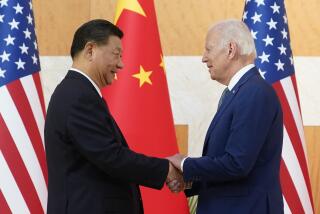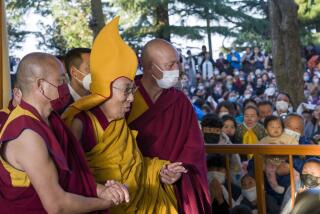Washington to Beijing: Live and Let Live : U.S. leaders welcome the Dalai Lama, to China’s chagrin
- Share via
In a noteworthy departure from his usual wishy-washy approach to China, President Bush took time this week to meet privately with the Dalai Lama, the spiritual leader of Tibet in exile. Since the United States and China normalized relations more than a decade ago, the White House has routinely snubbed the religious leader during his U.S. visits so as not to upset Beijing.
Well, now the Chinese are angry with President Bush and Congress. That’s because the Dalai Lama not only held a cordial meeting with Bush, he also addressed members of Congress in the Capitol rotunda on Thursday, appealing to the United States to aid Tibet in its quest for independence.
China filed a formal protest with the State Department, objecting to the meetings with the Dalai Lama, who has long symbolized the Chinese government’s repression of human rights and free expression.
The White House rightly expressed no regret. The meeting with Bush was appropriate, especially considering recent reports of new government arrests of protesting monks in Tibet. The Administration has been pressing the issue of human rights with Beijing, which consistently has rejected foreign criticism of its political repression and religious persecution as interference in its internal affairs.
But the message in Bush’s meeting with the Dalai Lama may not have been about human rights alone. The Administration increasingly is concerned about China’s continuing arms sales. Beijing has sold missile systems to Pakistan in violation of pledges made to Washington, has almost completed construction of a nuclear reactor in the Algerian desert, and is negotiating to sell missiles to Syria.
The sticky political question of arms sales arises as China’s most-favored-nation trading status comes before Congress for renewal in June. The U.S. trade deficit with China has grown to become the United States’ third-largest. The Administration has sought cooperative efforts with Beijing to tip the balance back toward the United States.
After the religious leader’s address to congressional leaders, the Senate passed a resolution condemning Chinese repression and expressing support for Tibet’s independence movement. The Senate has taken similar actions in the past, but previous Presidents, including Bush just last year, discouraged demonstrations of U.S. support. This year, however, the President was sympathetic to Tibet’s moral cause of freedom and liberty. Undaunted by Beijing’s displeasure, Bush acted appropriately in urging the followers of the Dalai Lama and the Chinese government to resolve their dispute peacefully.
More to Read
Sign up for Essential California
The most important California stories and recommendations in your inbox every morning.
You may occasionally receive promotional content from the Los Angeles Times.













